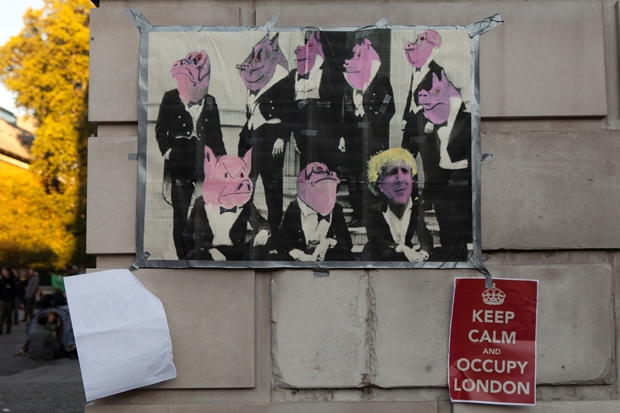I’m getting a lot of abuse on Twitter for saying that having been a member of the Bullingdon is more of a hindrance than a help in contemporary Britain. My comment was a response to a piece by Charlotte Proudman in the Guardian on Monday that Oxford and Cambridge’s drinking clubs ‘cement the succession of power and influence in Britain among a narrow elite’.
In response to my claim, numerous people have pointed out that the Prime Minister, the Chancellor of the Exchequer and the Mayor of London were all members of the Bullingdon. The problem with this rebuttal is that merely pointing out that Cameron, Osborne and Johnson are successful politicians doesn’t, by itself, prove their membership wasn’t a hindrance. It could be that all the other advantages they enjoyed — high IQ, good education, devoted parents, bags of drive and ambition, etc. — combined to overcome the disadvantage of being associated with Oxford’s most notorious student society.
Why do I think it was a handicap? Well, for starters, every time one of those Gillman and Soame photographs showing them posing in their tailcoats is reproduced, it makes them look posh and out of touch. The photographs are rarely reprinted without a reference being made to members of the club getting drunk and smashing up restaurants — not a good look in contemporary politics. And the fact that the club was male-only instantly antagonises a decent percentage of half the population, not just radical feminists like Proudman.
But it isn’t just me who thinks the Bullingdon is a curse. Do those who believe it has helped Cameron and Osborne think the reason Ed Miliband kept harping on about it at PMQs was to boost their electoral prospects? Indeed, the very same people who are attacking me on Twitter for saying their association with an elite Oxford dining society is harmful to their reputations don’t hesitate to remind people of it at every opportunity.
OK, Proudman might say. Perhaps the optics of being a member of the Bullingdon isn’t good for your image if you’re a frontline politician. But that handicap is more than offset by the whopping great leg-up you get from having been anointed as a future member of the ruling class at Oxford. According to this view, Oxford and Cambridge’s all-male drinking clubs operate as a kind of careers advice service for well-connected public schoolboys, putting them in touch with old members who can help them gain entry to elite professions like banking, politics and the law. That was certainly the impression given by The Riot Club, Laura Wade’s well-received play (and film) about the Bullingdon.
The problem with this view is that not every member of the club — or indeed Oxbridge drinking societies in general — has been catapulted to the top. There have been several ‘Where are they now?’ features about the other eight people in the Bullingdon photograph featuring Cameron and Johnson, and none of them have exactly set the world on fire. If the Bullingdon is an elite careers service, it isn’t doing a great job.
More importantly, this theory of how the ruling class renews itself is out of date — as out of date, in its own way, as the Bullingdon. It assumes that rapid advancement in Britain’s elite professions is simply a matter of buying your way into the right -networks — or having your -parents buy your way in — and neglects the extent to which those networks and professions have embraced meritocracy.
Believe it or not, you have to take a test to be admitted into an elite public school like Eton or St Paul’s and — incredible but true — you don’t just automatically get a place at Oxford or Cambridge if you’ve been to one. The same goes for entry into professions like medicine and accountancy, all of which surround themselves with hurdles that successful entrants have to overcome. In the case of frontline politics, you have to pass an additional test, too — you have to get elected.
I’m not arguing that Britain has become wholly meritocratic and that everyone at the top deserves to be there on merit alone. But unless you acknowledge that the establishment has become at least partially meritocratic in order to preserve its legitimacy, you won’t begin to understand how contemporary Britain works. Charlotte Proudman’s hypothesis would have been true at almost any time in Oxford’s 919-year history, but not in the past 50.







Comments